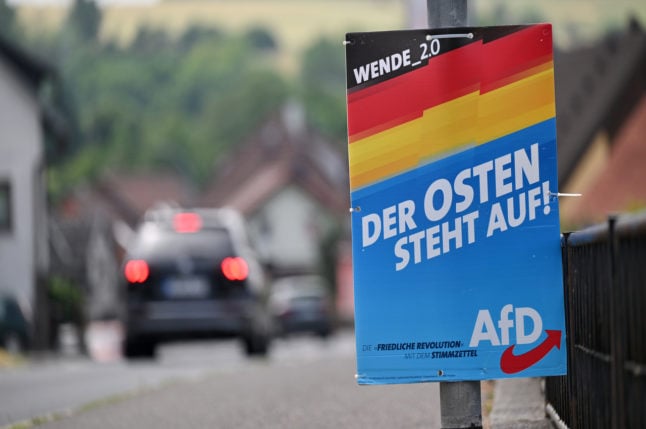The far–right Alternative for Germany (AfD) have established themselves as second place in the national polls, with significant polling leads across most of east Germany and a number of victories in mayoral and district council races that have shocked many in mainstream German society.
Last week a study, called the FES Mitte, showed that the number of right-wing extremists in Germany had practically tripled in a few years, while also showing rises in homophobia, xenophobia and belief in conspiracy theories.
READ ALSO: Number of right-wing extremists in Germany ‘triples’
But what’s behind this?
The study’s co-author Beate Küpper blamed the rise in these attitudes on the rise of an increasingly confident and aggressive populism, which blames “the system” and “migration” for society’s problems, as well as the “multiple crises” that Germany has experienced in recent years, such as the Covid-19 pandemic, the climate crisis and the energy crisis caused by the country’s reliance on Russian gas, imports of which were stopped after Russia’s full scale invasion of Ukraine in February 2022.
Alexander Clarkson, lecturer in German studies at King’s College London and a specialist in migration, thinks that the pandemic could have been more influential than people realise in the AfD’s radicalisation, while warning that there might never be a “return to normal” on some of the issues that motivate AfD voters.

Due to the shared centre ground between most parties on issues such as climate change or supporting Ukraine against Russia’s invasion, the AfD can portray themselves as the only actual alternative for Germany on a whole range of issues, such as protesting the Covid-19 pandemic lockdowns, migration or climate-friendly measures that might be costly for citizens in the short term.
“With regard to migration, the AfD can say ‘we’re the only representative of this voice’ as there are political dynamics where governments talk tough on migration but need to take them in for economic reasons,” said Clarkson.
“We need to look at specifics of the last few years – the pandemic, the war and the sudden surge in climate protection legislation like the Heizungsgesetzt,” Clarkson continued, talking of the controversial heating law that saw raucous protests in Bavaria would have started to phase out gas and oil boilers by next year but was watered down.
But the academic thinks that the pandemic played a large and so-far understudied role in how far–right ideas have spread across Germany.
“The Covid pandemic plays a central role,” he said. “Life was really bizarre and screwed up. You have far–right movements telling you that this democratic state is just a facade … and then the government tells people to stay in the homes, you have a [largely justified] highly coercive policy by a democratic state. But then the far around can turn around and say ‘I told you so – they did lock you in your homes.’
“People underestimated how much distrust of the state flowed out of the pandemic. Then the AfD can work with that when huge changes [like large-scale migration and climate protection legislation] are demanded quickly. The pandemic allowed the AfD to survive the 2021 election, but it radicalised the AfD’s base, so as additional crises come in, it opens up a much wider range of the electorate to these ideas.”
READ ALSO: Why are the far-right AfD doing so well in German polls?
And then instead of returning to normal, straight after the pandemic Russia’s full-scale invasion of Ukraine became the next crisis, which is stressful for citizens. “We didn’t return to normality, we returned to crisis. Normal keeps not happening,” said Clarkson, warning that we may have to get used to living in multiple crises.
Amid a controversial cover of the news magazine Der Spiegel, which has been compared to both a 1920s antisemitic advert and a poster by Nigel Farage during the Brexit campaign, the topic of migration is once again causing huge political debate in Germany, as rising numbers of migrants and asylum seekers come to the country, alongside over a million Ukrainian refugees who will stay in Germany, particularly in places where there has been very little diversity previously.
Der Spiegel nutzt ein Bild für sein Cover das so immer wieder von radikal rechts verwendet wird. Warum gibt es keine kritische Reflexion in Medien wie man zum Steigbügelhalter der radikalen Rechten wird? Die vierte Gewalt erodiert aktiv unsere liberale Demokratie. pic.twitter.com/qXF44diit7
— Tarik Abou-Chadi (@tabouchadi) September 23, 2023
But despite fluctuations in polls, Clarkson warns that we shouldn’t take the idea Germany is getting significantly more right wing at face value.
“The [conservative Christian Democrats] CDU going to the centre and abandoning claims to pre-1937 beyond the Oder-Niesse line, or say LGBT rights or shifts on issues of migration, all of this stuff is transforming what it means to be centre-right,” he said.
Clarkson said one problem centres on what is viewed as far-right in Germany and that this can change.
“Racist views that are now rightly classified as far–right were pretty normal in the 1980s in the CDU, and even the [social democratic] SPD,” he said.



 Please whitelist us to continue reading.
Please whitelist us to continue reading.
Member comments